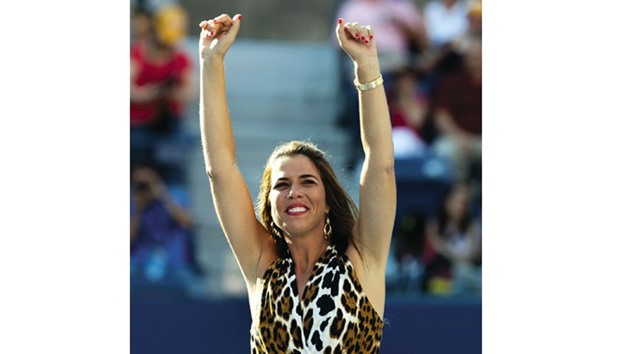Russian officials threw their backing behind tennis star Maria Sharapova yesterday after she admitted to failing a drug test at the Australian Open.
“I feel sorry for Masha. I hope that we will see her back on court and we are prepared to support her,” sports minister Vitaly Mutko told state-run TASS news agency, using the Russian diminutive of Sharapova’s first name. “She travels from tournament to tournament and has a punishing schedule. The people in her team should be looking out for her.”
Sharapova announced on Monday that she had tested positive for meldonium, a drug she said she had been taking since 2006 but that was only added to the banned list this year.
The former world number one from Russia said a change in the World Anti-Doping Agency’s banned list for 2016 led to an inadvertent violation, for which she will be “provisionally suspended” by the International Tennis Federation.
Sharapova said she originally began taking meldonium for a variety of symptoms, including a tendency to become ill often, an irregular EKG heart test and a family history of diabetes.
Meldonium—manufactured in Latvia but not approved by US regulators—is used to treat heart trouble, including angina and heart failure.
Sharapova said she was co-operating with the ITF and did not yet know the extent of the sanctions she would face. Her attorney, John Haggerty, said the positive test could carry a ban of up to four years, but that mitigating circumstances could see a lesser penalty.
Shamil Tarpishchev, head of the Russian tennis federation, told TASS he believed Sharapova would still have a chance to play at the Rio Olympics in August. In a statement released by the federation, Tarpishchev pledged to do “everything that is needed from our side to help Masha”.
“The Russian Tennis Federation supports Masha and we are sure that she will emerge with dignity from this trial,” the statement added.
A string of sports figures have tested positive for meldonium this year, including Russian ice dancer Ekaterina Bobrova, Ukrainian biathletes Artem Tyshchenko and Olga Abramova and Ethiopian-born Swede Abebe Aregawi, the 2013 women’s 1,500m world champion.
Mutko warned that more Russian competitors could be hit by the meldonium ban and said he would summon the country’s sports chiefs to discuss the issue.
“It seems that we are in for some shocks because of this medicine,” Mutko said. “Unfortunately I think there will still be some more cases.”
Russia is currently embroiled in a separate scandal over allegations of state-sponsored doping in track and field that has seen the country’s team banned from international competition and facing the possibility of missing out on the Rio Olympic Games this summer.
Sharapova, who was born in Siberia but left the country for the US aged seven, represents Russia in the Fed Cup and claimed silver for the country at the 2012 London Olympic Games.
She carried the torch into the stadium for the opening of the 2014 Winter Olympics in Sochi, an event that was championed by Russian President Vladimir Putin.
Capriati lashes out at Maria
Former Grand Slam champion Jennifer Capriati lashed out at Maria Sharapova on Twitter on Monday after the Russian announced she had tested positive for a banned drug at the Australian Open in January.
In a series of tweets that didn’t mention Sharapova by name, Capriati said she was “disappointed”
“I had to lose my career and never opted to cheat no matter what,” Capriati tweeted. “I had to throw in the towel and suffer. I didn’t have the high priced team of (doctors) that found a way for me to cheat and get around the system and wait for science to catch up.”
During a quickly convened news conference at a Los Angeles hotel on Monday, Sharapova said she tested positive for meldonium, a circulation-boosting drug used to treat heart ailments that was added to the World Anti-Doping Agency’s banned list this year.
Sharapova said she had been taking the drug for health problems on medical advice since 2006, and through her own negligence failed to realize it had been banned.
“What’s the point of someone taking a heart medicine that helps your heart recover faster unless you have a heart condition? Is that accurate?” Capriati asked.
“In my opinion (if) it’s all true every title should be stripped. This is other people’s lives as well.”
At her induction into the Tennis Hall of Fame in 2012, Capriati said she felt injuries had forced her to leave the game sooner than she wanted.
She launched her career at 14, but after winning Olympic gold at Barcelona in 1992 she was sidetracked by off-court troubles, including arrests for shoplifting and marijuana possession. She returned to tennis in 1996 and won the first of her three Grand Slams at the Australian Open in 2001, adding the French Open title and another Australian crown before she retired in 2004.

Jennifer Capriati
